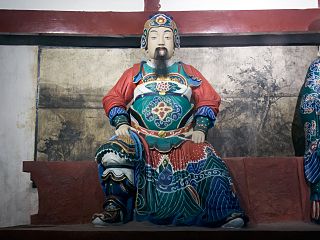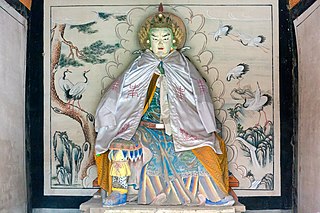Related Research Articles

Zhang Fei,courtesy name Yide,was a Chinese military general and politician serving under the warlord Liu Bei in the late Eastern Han dynasty and early Three Kingdoms period of China. Zhang Fei and Guan Yu,who were among the earliest to join Liu Bei,shared a brotherly relationship with their lord and accompanied him on most of his early exploits. Zhang Fei fought in various battles on Liu Bei's side,including the Red Cliffs campaign (208–209),takeover of Yi Province (212–214),and Hanzhong Campaign (217–218). He was assassinated by his subordinates in 221 after serving for only a few months in the state of Shu Han,which was founded by Liu Bei earlier that year.

Chen Shou,courtesy name Chengzuo (承祚),was a Chinese historian,politician,and writer who lived during the Three Kingdoms period and Jin dynasty of China. Chen Shou is most known for his most celebrated work,the Records of the Three Kingdoms (Sanguozhi),which records the history of the late Eastern Han dynasty and the Three Kingdoms period. Chen Shou wrote the Sanguozhi primarily in the form of biographies of notable persons of those eras. Today,Chen's Records of the Three Kingdoms is part of the Twenty-Four Histories canon of ancient Chinese history.

Pang Tong (179–214),courtesy name Shiyuan,was a Chinese politician who served as the key adviser to the warlord Liu Bei in the late Eastern Han dynasty of China. In his youth,Pang Tong was disregarded because he was plain looking,however Sima Hui highly esteemed him calling him the "Crown of Scholars in Jing Province". He studied under him along with Zhuge Liang,Xu Shu and Xiang Lang and was given the nickname of "Fledgling Phoenix". Because of his friendly attitude,he worked as an appraiser in Nan Commandery. When reviewing someone,he would prioritize their virtue over their abilities and would encourage them to help others.

Cao Zhen,courtesy name Zidan,was a military general of the state of Cao Wei during the Three Kingdoms period of China. He was an adopted son of Cao Cao,a warlord who rose to power in the late Eastern Han dynasty and laid the foundation for Wei. After Cao Cao's death and the end of the Eastern Han dynasty,Cao Zhen served under Cao Pi and Cao Rui,the first two emperors of Wei. He is best known for leading a successful defence of Wei from the first two of a series of invasions by Wei's rival state,Shu Han,between 228 and 229.

Jiang Wan,courtesy name Gongyan,was a Chinese military general,politician,and regent of the state of Shu during the Three Kingdoms period of China. Born in the late Eastern Han dynasty,Jiang Wan initially served as a scribe,county chief and county prefect under the warlord Liu Bei,who later became the founding emperor of Shu. After Liu Bei's son Liu Shan succeeded his father as emperor in 223,Jiang Wan gradually rose to prominence under the regency of Zhuge Liang,the Imperial Chancellor of Shu. Between 228 and 234,while Zhuge Liang was away leading Shu forces on the Northern Expeditions against Shu's rival state Wei,Jiang Wan took charge of internal affairs and provided logistical support to the Shu forces at the frontline. After Zhuge Liang's death in 234,Jiang Wan succeeded him as regent and did well in gaining the Shu people's confidence and leading them into a post-Zhuge Liang era. During this time,he considered that the land-based route through the Qin Mountains used by Zhuge Liang during the Northern Expeditions was too difficult for navigation and transportation of supplies. He thus came up with a plan to switch to a water-based route along the Han River targeting Wei territories in present-day southern Shaanxi and northwestern Hubei. However,the Shu government rejected his plan as they thought it was too risky. In 243,due to poor health,Jiang Wan relocated from Hanzhong near the Wei–Shu border to Fu County. Towards the final years of his regency,as his health worsened,Jiang Wan gradually relinquished his powers to his deputies Fei Yi and Dong Yun but he continued to rule as regent in name. He died in 246 and was succeeded by Fei Yi.
Li Yan,courtesy name Zhengfang,also known as Li Ping,was a military general of the state of Shu Han during the Three Kingdoms period of China. He climbed to the zenith of his career when he was asked by the Shu emperor Liu Bei to be the military paramountcy and co-regent alongside Zhuge Liang for his son and successor,Liu Shan. After the death of Liu Bei,Li Yan was given the rank of General of the Vanguard which was last held by Guan Yu back in 220. Li served most of his career in the mid and late 220s as the area commander for the Eastern Front centered in Yong An with Chen Dao as his deputy;he never faced any major battles in his position. However,during the 230s and the 4th of Zhuge Liang's Northern Expeditions,Li Yan was given a higher rank of General of the Agile Cavalry,below only Zhuge Liang. He was assigned to handle logistics,but he was unable to deliver supplies to Zhuge Liang's army in a timely manner. After his attempt to fraudulently cover his inability to follow commands,Li Yan was stripped from positions and power.
Empress Quan,also known as Quan Huijie,was an empress of the state of Eastern Wu during the Three Kingdoms period of China. She was married to Sun Liang,the second emperor of Wu.

Dong Yun,courtesy name Xiuzhao,was a Chinese general and politician of the state of Shu Han during the Three Kingdoms period of China. His father,Dong He,also served as an official in Shu. Dong Yun was one of four persons who held positions equivalent to a head of government in Shu from 221 to 253;the other three were Zhuge Liang,Jiang Wan and Fei Yi.

Deng Zhi,courtesy name Bomiao,was a government official,diplomat and military general of the state of Shu Han during the Three Kingdoms period of China. A descendant of Deng Yu,Deng Zhi started his career in the late Eastern Han dynasty under the warlord Liu Bei as a low-level officer in Pi County. After Liu Bei discovered his talent,Deng Zhi steadily rose through the ranks to become a county prefect and later a commandery administrator and imperial secretary. In 223,the Shu regent Zhuge Liang sent him as Shu's envoy to meet Sun Quan,the ruler of Shu's ally state Wu,and reestablish the Wu–Shu alliance against their common rival state Wei. Deng Zhi succeeded in his mission and earned praise from Sun Quan for strengthening Wu–Shu ties. In 227,Deng Zhi became a military general and he participated in the first Shu invasion of Wei by leading a decoy force with Zhao Yun to distract the Wei general Cao Zhen. Although they lost the battle,Deng Zhi and Zhao Yun managed to rally their troops to put up a firm defence during their retreat and minimise their losses. Following Zhuge Liang's death in 234,Deng Zhi rose to higher general ranks and was stationed in present-day Chongqing for about 10 years before he was recalled back to the Shu capital Chengdu in his 70s to serve as General of Chariots and Cavalry. In 248,he suppressed a rebellion in Fuling. He died in 251.

Yang Yi,courtesy name Weigong,was an official of the state of Shu Han in the Three Kingdoms period of China.

Ma Zhong,courtesy name Dexin,originally named Hu Du,was a military general of the state of Shu Han during the Three Kingdoms period of China. Liu Bei was quite impressed by Ma Zhong and praised him highly,comparing him to the recently defected Huang Quan,Ma Zhong was trusted and respected by the following head of the government Zhuge Liang,Jiang Wan and Fei Yi. After Liu Bei's death,he served under Zhuge Liang during the Southern Campaign and helped to quell the rebellion. He was appointed as the area commander in the south after Li Hui's death. He spends most of his life pacify the region and protecting the people of the south often with the help of Zhang Ni. Ma Zhong was known as a generous and whimsical man but he was also decisive in handling affairs. Hence the southern tribes both feared him and respected him. His duty in the south could be comparable to Wang Ping in the north and Deng Zhi in the east. After his death,the foreigners sorely missed him and later established a temple in his honor.

Zhang Yi,courtesy name Bogong,was a Chinese military general and politician of the state of Shu Han during the Three Kingdoms period of China. Born in the late Eastern Han dynasty,Zhang Yi was a 10th-generation descendant of Zhang Liang. He started his career as a scribe under the warlord Liu Bei,who founded Shu later,and gradually rose to the positions of a county prefect and commandery administrator. In the early 230s,he served as an area commander tasked with maintaining the peace in Shu's southern commanderies. In 234,he led the Shu vanguard during the Battle of Wuzhang Plains against Shu's rival state Wei. From 238 to 259,Zhang Yi steadily rose through the ranks to become one of Shu's top generals. During this time,although he strongly opposed the Shu general Jiang Wei's aggressive stance towards Wei,he still accompanied Jiang Wei on his military campaigns against Wei. In 263,he surrendered to Wei forces along with the Shu emperor Liu Shan when Wei launched a large-scale invasion of Shu. In the following year,Zhang Yi was killed by mutineers during a rebellion by the Wei general Zhong Hui. Like Liao Hua and Zong Yu,Zhang was one of few officials who served the Shu-Han state throughout its entire existence.
Liu Bei's takeover of Yi Province was a military campaign by the warlord Liu Bei in taking control of Yi Province from the provincial governor,Liu Zhang. The campaign took place between the years 211 and 214 in the late Eastern Han dynasty;although the conflict between Liu Bei and Liu Zhang started in January or February 213 when the latter discovered the former secret communications and subsequently executed Zhang Song. It concluded with victory for Liu Bei and his successful takeover of the province from Liu Zhang in July 214. Yi Province would serve as the foundation of the state of Shu Han during the Three Kingdoms period.
LüYi,courtesy name Jiyang,was an official of the state of Shu Han during the Three Kingdoms period of China.
Du Wei,courtesy name Guofu,was a scholar who rejected service,including via faking of poor health,before eventually becoming an official of the state of Shu Han during the Three Kingdoms period of China.
Zhuge Xuan was a Chinese politician who lived during the late Eastern Han dynasty of China. He is best known for briefly serving as the Administrator of Yuzhang Commandery in the mid-190s. He was also a cousin-uncle of Zhuge Liang,a prominent statesman of the state of Shu Han during the Three Kingdoms period.
Yang Xi,courtesy name Wenran,was an official of the state of Shu Han during the Three Kingdoms period of China. He is best known for writing the Ji Han Fuchen Zan,a collection of praises of notable persons who served in the Shu Han state. Chen Shou,the third-century historian who wrote the Records of the Three Kingdoms (Sanguozhi),extensively quoted and annotated Yang Xi's collection.
Li Fu,courtesy name Sunde,was an official of the state of Shu Han during the Three Kingdoms period of China.
Li Miao,courtesy name Hannan,was an official of the state of Shu Han during the Three Kingdoms period of China. He previously served under the warlord Liu Zhang and later Liu Bei in the late Eastern Han dynasty.

Yang Hong,courtesy name Jixiu,was an official of the state of Shu Han during the Three Kingdoms period of China.
References
- ↑ (伷字子緒,亦閬中人。) Sanguozhi vol. 45.
- ↑ (先主定益州後,為功曹書佐。) Sanguozhi vol. 45.
- ↑ (時郡內士人龔祿、姚伷位二千石,當世有聲名,皆與嶷友善。) Sanguozhi vol. 43.
- ↑ (建興元年,為廣漢太守。) Sanguozhi vol. 45.
- ↑ (丞相亮北駐漢中,闢為掾。並進文武之士,) Sanguozhi vol. 45.
- ↑ (亮稱曰:「忠益者莫大於進人,進人者各務其所尚;今姚掾並存剛柔,以廣文武之用,可謂博雅矣,原諸掾各希此事,以屬其望。」) Sanguozhi vol. 45.
- ↑ (遷為參軍。亮卒,稍遷為尚書僕射。) Sanguozhi vol. 45.
- ↑ (時人服其真誠篤粹。延熙五年卒,在作讚之後。) Sanguozhi vol. 45.
- Chen, Shou (3rd century). Records of the Three Kingdoms (Sanguozhi).